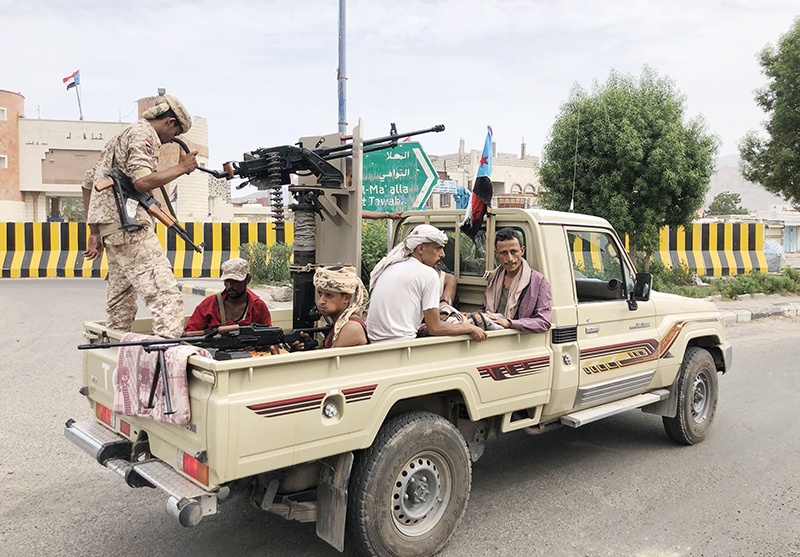
WASHINGTON/ADEN:
The United States is preparing to open direct talks with Iran-aligned Houthi
rebels in a bid to end Yemen's war which has claimed thousands of lives, the
Wall Street Journal reported yesterday. The proposed initiative, the first
direct negotiations between Washington and the Houthis in over four years,
comes as the rebels have stepped up missile and drone attacks on neighboring
Saudi Arabia.
"The United
States is looking to prod Saudi Arabia into taking part in secret talks in Oman
with Huthi leaders in an effort to broker a ceasefire in Yemen," The Wall
Street Journal reported, citing unnamed people familiar with the plans. The
move could open the first significant channel between President Donald Trump's
administration and the Houthis at a time when fears of a broader regional war
are growing, the newspaper said.
The toppling of
the Yemen government by the Houthis in 2015 triggered the launch of a Saudi-led
military intervention to quell the rebel forces, but the Yemen conflict has
since become even more complex and multi-layered. The US negotiating team would
be led by Christopher Henzel, a veteran diplomat who became the Trump
administration's first ambassador to Yemen in April, the newspaper said.
Under the
administration of former president Barack Obama, US officials held brief talks
with Houthi leaders in June 2015, just three months after the Saudi
intervention began, to convince them to attend UN-sponsored peace talks in
Geneva to resolve the crisis. The Geneva conference and further rounds of
negotiations failed to resolve the crisis, which has pushed impoverished Yemen
to the brink of famine.
The Wall Street
Journal said US officials were set to meet with Saudi leaders to push them to
take a diplomatic approach. Prince Khalid bin Salman, the Saudi deputy defense
minister and brother of Crown Prince Mohammed bin Salman, arrived in Washington
this week for talks with a number of US officials. The Journal said he would
meet with Secretary of State Mike Pompeo.
Meanwhile, Yemen
government forces reclaimed the interim capital Aden and its presidential
palace yesterday, a minister said, pushing back separatists who seized the city
and other parts of the south earlier this month. The separatists' losses came
nearly three weeks after the pro-independence Southern Transitional Council
(STC) took control of Aden, the government's base since Houthi rebels took over
the northern capital Sanaa in 2014.
Forces loyal to
the internationally recognized government of Yemeni President Abedrabbo Mansour
Hadi were able "to secure the presidential palace in Aden and the
surrounding areas," Information Minister Moammer Al-Eryani tweeted.
"The national army and security services have full control over the
province's districts."
The clashes
between the STC and government forces - who for years have fought alongside
each other against the Houthis - have raised concerns that the
famine-threatened country could break apart entirely. The separatists' seizure
of Aden was seen as a major gain allowing the Security Belt, a paramilitary
force loyal to the STC, to press on to take other strategic areas.
However, the
Yemeni government drafted in reinforcements from the north and mounted a pushback
that appears to have met little resistance. An AFP correspondent in the east of
the city witnessed shelling by advancing government forces who came fresh from
their success in taking back control of Abyan province to the east yesterday. A
pro-government source told AFP that fighting had erupted in the streets of Aden
as loyalist troops fanned out there.
Abyan was the
second southern province to be retaken by government forces in southern Yemen
in days following clashes with the Security Belt. Earlier in the week,
government forces also regained control of Shabwa province after beating back
an attack by STC forces. The Yemeni interior ministry issued a statement urging
the separatists to "lay down their arms" and surrender.
The new fighting
comes despite repeated calls for a ceasefire by a Saudi-led coalition, which
intervened in the war in 2015 in support of the government after the Houthis
seized the capital Sanaa and much of Yemen - the Arab world's poorest nation.
Since then, the conflict has killed tens of thousands of people, mostly
civilians, in what the United Nations has described as the world's worst
humanitarian crisis.
While they have
also fought against the Houthis, STC forces want to see South Yemen regain the
independence it gave up with unification in 1990. The separatists want to
address what they say is a history of exploitation and marginalization of their
people. "We will sail together towards the safe harbor chosen by our
people who have fought for this for so long," STC leader Aidarous
Al-Zoubeidi - a popular and charismatic figure in the south - said in a speech
on Tuesday.
The separatists
have received support and training from the United Arab Emirates, even though
it is a key pillar in the Saudi-led coalition backing the Yemeni government
against the Houthi rebels. The Yemeni government has repeatedly accused the UAE
of "being responsible for the armed rebellion" in the south and urged
it to stop backing "this militia". Analysts say the break between
Hadi's government and the separatists reflects a wider rift between Riyadh and
Abu Dhabi.
But the UAE has
rejected accusations it supported the separatists in their seizure of Aden and
said it was "exerting all efforts to de-escalate the situation in
Yemen". In a joint statement this week, Saudi Arabia and the UAE called
for cooperation with a coalition committee and for peace talks in the Saudi
city of Jeddah. - Agencies










